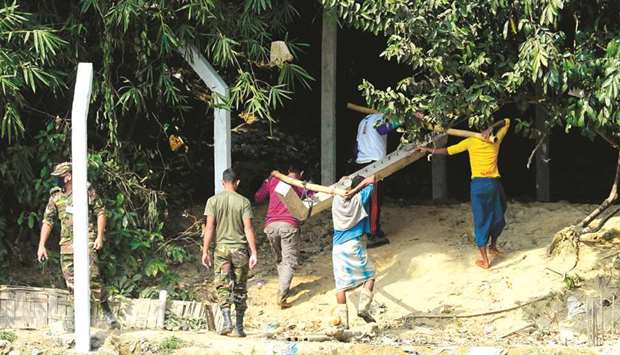The Bangladeshi military has started erecting fences around camps housing hundreds of thousands of Rohingya refugees despite complaints from community leaders and rights groups.
An AFP correspondent yesterday saw troops in military fatigues erecting pillars for barbed-wire fences around one large camp at Balukhali in the southeastern border district Cox’s Bazar.
Bangladesh’s refugee commissioner Mahhbub Alam Talukder confirmed that construction had begun but declined to comment further.
Army chief General Aziz Ahmed said late last month that army engineers had begun erecting the pillars and that the military has “placed orders” for barbed wire.
The camps house nearly a million members of the mostly Muslim Rohingya minority, around 750,000 of whom fled a military offensive in neighbouring Myanmar in August 2017.
Frustration has been growing in Bangladesh about hosting the refugees, particularly since the latest attempt to repatriate them to Myanmar failed in August.
The refugees are already forbidden to leave the camps although their sprawling nature means authorities have been unable to police all their movements.
New checkpoints on the main roads leading to the camps stop Rohingya and send them back to the settlements when they try to travel to other parts of Bangladesh.
It has imposed a blackout on high-speed Internet in the Rohingya settlements, confiscated SIM cards and mobile phones used by the refugees, and filed cases against hundreds for illegally obtaining citizenship cards.
The move to construct barbed-wire fences has been condemned by Rohingya leaders who said they would create a “panic” among the Rohingya.
“It will restrict our movement. We have to walk a long distance to get food rations from the authorities,” said Mohamed Hashim as he watched troops digging holes for pillars.
“The children won’t be able to play any more.”
Earlier rights groups also condemned the move, saying the fencing could transform the camps into “a big prison”.
“The Bangladesh government shouldn’t turn Rohingya refugee camps into open air prisons. Barbed wire and guard towers should be reserved for criminals, not people who fled Myanmar to escape from mass atrocities,” Brad Adams, Asia director at Human Rights Watch, said in a comment.
“The Bangladesh government now risks squandering the global goodwill it had earned when it allowed the Rohingya to cross into safety,” he added.
UN experts have expressed serious concerns about these restrictions.
Local resident Abdul Gaffar, who lives near the Balukhali camp, also complained.
“The pillars erected for fencing were constructed on the locals’ paddy field. Many locals living here will also be trapped inside fences,” he said.

Labourers carry a concrete pillar as Bangladesh authorities prepare erecting pillars for barbed-wire fences around Balukhali refugee camp in Ukhia yesterday.
